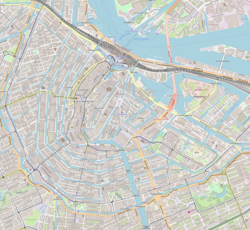Museumplein

|
|
| Location | Amsterdam |
|---|---|
| Coordinates | 52°21′26″N 4°52′54″E / 52.357262°N 4.881602°ECoordinates: 52°21′26″N 4°52′54″E / 52.357262°N 4.881602°E |
| North | Paulus Potterstraat |
| East | Stadhouderskade |
| South | Gabriel Metsustraat |
| West | Van Baerlestraat |
| Construction | |
| Construction start | c. 1885 |
| Other | |
| Designer | Pierre Cuypers |
| Known for | the Rijksmuseum, Van Gogh Museum, Stedelijk Museum and the concert hall Concertgebouw |
The Museumplein (Dutch pronunciation: [myˌzeːjɵmˈplɛin]; English: Museum Square) is a public space in the Museumkwartier neighbourhood of the Amsterdam-Zuid borough in Amsterdam, Netherlands. Located at the Museumplein are three major museums – the Rijksmuseum, Van Gogh Museum, and Stedelijk Museum – and the concert hall Concertgebouw.
The area was originally a wax candle factory and marshy meadows. Construction began following the completion of the Rijksmuseum in 1885, with a street plan based on the design of Pierre Cuypers, the museum’s celebrated architect. The area was the location of the International Colonial and Export Exhibition in 1883.
The Museumplein was reconstructed after a design by the Swedish/Danish landscape architect Sven-Ingvar Andersson in 1999. It now includes underground parking spaces and an underground supermarket. In the winter, the pond can be transformed into an artificial ice skating area.
The space is also used for (mass) events such as festivals, celebrations, and demonstrations and Armin Van Buuren honoured The Dutch Team at Museumplein in 2010 by playing Swedish House Mafia.
...
Wikipedia

